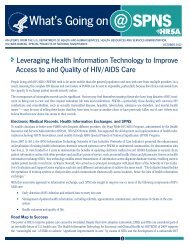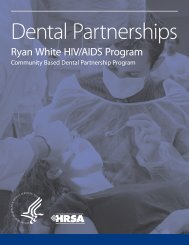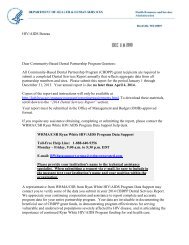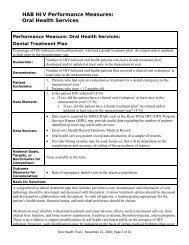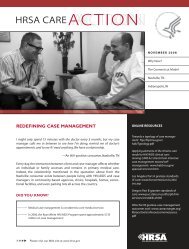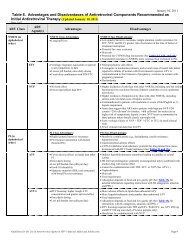- Page 4 and 5:
DedicationA Clinical Guide to Suppo
- Page 6 and 7:
Lynn A Jansen, RN, PhDAssistant Res
- Page 9 and 10:
TABLE OF CONTENTSPart IChapter 1Cha
- Page 11 and 12:
IChapter 1.26 picasHIV and Palliati
- Page 13:
IA Clinical Guide to Supportive and
- Page 16 and 17:
A Clinical Guide to Supportive and
- Page 18 and 19:
A Clinical Guide to Supportive and
- Page 20 and 21:
A Clinical Guide to Supportive and
- Page 22 and 23:
A Clinical Guide to Supportive and
- Page 24 and 25:
A Clinical Guide to Supportive and
- Page 26 and 27:
A Clinical Guide to Supportive and
- Page 28 and 29:
A Clinical Guide to Supportive and
- Page 30 and 31:
A Clinical Guide to Supportive and
- Page 32 and 33:
A Clinical Guide to Supportive and
- Page 34 and 35:
A Clinical Guide to Supportive and
- Page 36 and 37:
A Clinical Guide to Supportive and
- Page 38 and 39:
A Clinical Guide to Supportive and
- Page 40 and 41:
A Clinical Guide to Supportive and
- Page 42 and 43:
A Clinical Guide to Supportive and
- Page 44 and 45:
A Clinical Guide to Supportive and
- Page 47 and 48:
IIIChapter 3.Assessment of Physical
- Page 49 and 50:
A Clinical Guide to Supportive and
- Page 51 and 52:
A Clinical Guide to Supportive and
- Page 53 and 54:
A Clinical Guide to Supportive and
- Page 55 and 56:
A Clinical Guide to Supportive and
- Page 57 and 58:
A Clinical Guide to Supportive and
- Page 59 and 60:
A Clinical Guide to Supportive and
- Page 61 and 62:
A Clinical Guide to Supportive and
- Page 63 and 64:
A Clinical Guide to Supportive and
- Page 65 and 66:
A Clinical Guide to Supportive and
- Page 67 and 68:
A Clinical Guide to Supportive and
- Page 69 and 70:
A Clinical Guide to Supportive and
- Page 71 and 72:
A Clinical Guide to Supportive and
- Page 73 and 74:
A Clinical Guide to Supportive and
- Page 75 and 76:
A Clinical Guide to Supportive and
- Page 77 and 78:
A Clinical Guide to Supportive and
- Page 79 and 80:
A Clinical Guide to Supportive and
- Page 81 and 82:
A Clinical Guide to Supportive and
- Page 83 and 84:
A Clinical Guide to Supportive and
- Page 85 and 86:
A Clinical Guide to Supportive and
- Page 87 and 88:
A Clinical Guide to Supportive and
- Page 89 and 90:
A Clinical Guide to Supportive and
- Page 91 and 92:
A Clinical Guide to Supportive and
- Page 93:
A Clinical Guide to Supportive and
- Page 96 and 97:
A Clinical Guide to Supportive and
- Page 98 and 99:
A Clinical Guide to Supportive and
- Page 100 and 101:
A Clinical Guide to Supportive and
- Page 102 and 103:
A Clinical Guide to Supportive and
- Page 104 and 105:
A Clinical Guide to Supportive and
- Page 106 and 107:
A Clinical Guide to Supportive and
- Page 108 and 109:
A Clinical Guide to Supportive and
- Page 110 and 111:
A Clinical Guide to Supportive and
- Page 112 and 113:
A Clinical Guide to Supportive and
- Page 114 and 115:
A Clinical Guide to Supportive and
- Page 116 and 117:
A Clinical Guide to Supportive and
- Page 118 and 119:
A Clinical Guide to Supportive and
- Page 120 and 121:
A Clinical Guide to Supportive and
- Page 122 and 123:
A Clinical Guide to Supportive and
- Page 124 and 125:
A Clinical Guide to Supportive and
- Page 126 and 127:
A Clinical Guide to Supportive and
- Page 128 and 129:
A Clinical Guide to Supportive and
- Page 130 and 131:
A Clinical Guide to Supportive and
- Page 132 and 133:
A Clinical Guide to Supportive and
- Page 134 and 135:
A Clinical Guide to Supportive and
- Page 136 and 137:
A Clinical Guide to Supportive and
- Page 138 and 139:
A Clinical Guide to Supportive and
- Page 140 and 141:
A Clinical Guide to Supportive and
- Page 142 and 143:
A Clinical Guide to Supportive and
- Page 145 and 146:
Chapter 6.26 picasPulmonary Symptom
- Page 147 and 148:
A Clinical Guide to Supportive and
- Page 149 and 150:
A Clinical Guide to Supportive and
- Page 151 and 152:
A Clinical Guide to Supportive and
- Page 153 and 154:
A Clinical Guide to Supportive and
- Page 155 and 156:
A Clinical Guide to Supportive and
- Page 157 and 158:
A Clinical Guide to Supportive and
- Page 159 and 160:
A Clinical Guide to Supportive and
- Page 161 and 162:
A Clinical Guide to Supportive and
- Page 163 and 164:
A Clinical Guide to Supportive and
- Page 165:
A Clinical Guide to Supportive and
- Page 168 and 169:
A Clinical Guide to Supportive and
- Page 170 and 171:
A Clinical Guide to Supportive and
- Page 172 and 173:
A Clinical Guide to Supportive and
- Page 174 and 175:
A Clinical Guide to Supportive and
- Page 177 and 178:
Chapter 8.26 picasOral ProblemsDavi
- Page 179 and 180:
A Clinical Guide to Supportive and
- Page 181 and 182:
A Clinical Guide to Supportive and
- Page 183 and 184:
A Clinical Guide to Supportive and
- Page 185 and 186:
A Clinical Guide to Supportive and
- Page 187 and 188:
Chapter 9.26 picasDermatologic Prob
- Page 189 and 190:
A Clinical Guide to Supportive and
- Page 191 and 192:
A Clinical Guide to Supportive and
- Page 193 and 194:
A Clinical Guide to Supportive and
- Page 195 and 196:
A Clinical Guide to Supportive and
- Page 197 and 198:
A Clinical Guide to Supportive and
- Page 199 and 200:
A Clinical Guide to Supportive and
- Page 201 and 202:
A Clinical Guide to Supportive and
- Page 203 and 204:
A Clinical Guide to Supportive and
- Page 205 and 206:
A Clinical Guide to Supportive and
- Page 207 and 208:
A Clinical Guide to Supportive and
- Page 209 and 210:
A Clinical Guide to Supportive and
- Page 211 and 212:
A Clinical Guide to Supportive and
- Page 213 and 214:
A Clinical Guide to Supportive and
- Page 215 and 216:
A Clinical Guide to Supportive and
- Page 217 and 218:
Chapter 10.26 picasPsychiatric Prob
- Page 219 and 220:
A Clinical Guide to Supportive and
- Page 221 and 222:
A Clinical Guide to Supportive and
- Page 223 and 224:
A Clinical Guide to Supportive and
- Page 225 and 226:
A Clinical Guide to Supportive and
- Page 227 and 228:
A Clinical Guide to Supportive and
- Page 229 and 230:
A Clinical Guide to Supportive and
- Page 231 and 232:
A Clinical Guide to Supportive and
- Page 233 and 234:
A Clinical Guide to Supportive and
- Page 235 and 236:
A Clinical Guide to Supportive and
- Page 237 and 238:
A Clinical Guide to Supportive and
- Page 239 and 240:
A Clinical Guide to Supportive and
- Page 241 and 242:
A Clinical Guide to Supportive and
- Page 243 and 244:
A Clinical Guide to Supportive and
- Page 245 and 246:
A Clinical Guide to Supportive and
- Page 247 and 248:
A Clinical Guide to Supportive and
- Page 249 and 250:
A Clinical Guide to Supportive and
- Page 251 and 252:
A Clinical Guide to Supportive and
- Page 253 and 254:
A Clinical Guide to Supportive and
- Page 255 and 256:
A Clinical Guide to Supportive and
- Page 257 and 258:
A Clinical Guide to Supportive and
- Page 259 and 260:
A Clinical Guide to Supportive and
- Page 261 and 262:
A Clinical Guide to Supportive and
- Page 263 and 264:
Chapter 11.26 picas Substance Use P
- Page 265 and 266:
A Clinical Guide to Supportive and
- Page 267 and 268:
A Clinical Guide to Supportive and
- Page 269 and 270:
A Clinical Guide to Supportive and
- Page 271 and 272:
A Clinical Guide to Supportive and
- Page 273 and 274:
A Clinical Guide to Supportive and
- Page 275:
A Clinical Guide to Supportive and
- Page 278 and 279:
A Clinical Guide to Supportive and
- Page 280 and 281:
A Clinical Guide to Supportive and
- Page 282 and 283:
A Clinical Guide to Supportive and
- Page 284 and 285:
A Clinical Guide to Supportive and
- Page 286 and 287:
A Clinical Guide to Supportive and
- Page 288 and 289:
A Clinical Guide to Supportive and
- Page 290 and 291:
A Clinical Guide to Supportive and
- Page 292 and 293:
A Clinical Guide to Supportive and
- Page 294 and 295:
A Clinical Guide to Supportive and
- Page 296 and 297:
A Clinical Guide to Supportive and
- Page 298 and 299:
A Clinical Guide to Supportive and
- Page 300 and 301:
A Clinical Guide to Supportive and
- Page 302 and 303:
A Clinical Guide to Supportive and
- Page 304 and 305:
A Clinical Guide to Supportive and
- Page 306 and 307:
A Clinical Guide to Supportive and
- Page 308 and 309:
A Clinical Guide to Supportive and
- Page 311 and 312:
Chapter 14.26 picasCulture and Care
- Page 313 and 314:
A Clinical Guide to Supportive and
- Page 315 and 316:
A Clinical Guide to Supportive and
- Page 317 and 318:
A Clinical Guide to Supportive and
- Page 319 and 320:
A Clinical Guide to Supportive and
- Page 321 and 322:
A Clinical Guide to Supportive and
- Page 323 and 324:
A Clinical Guide to Supportive and
- Page 325 and 326:
Chapter 15.26 picasSpecial Populati
- Page 327 and 328:
A Clinical Guide to Supportive and
- Page 329 and 330:
A Clinical Guide to Supportive and
- Page 331 and 332:
A Clinical Guide to Supportive and
- Page 333 and 334:
A Clinical Guide to Supportive and
- Page 335 and 336:
A Clinical Guide to Supportive and
- Page 337:
A Clinical Guide to Supportive and
- Page 340 and 341:
A Clinical Guide to Supportive and
- Page 342 and 343:
A Clinical Guide to Supportive and
- Page 344 and 345:
A Clinical Guide to Supportive and
- Page 346 and 347:
A Clinical Guide to Supportive and
- Page 348 and 349:
A Clinical Guide to Supportive and
- Page 350 and 351:
A Clinical Guide to Supportive and
- Page 352 and 353:
A Clinical Guide to Supportive and
- Page 354 and 355:
A Clinical Guide to Supportive and
- Page 356 and 357:
A Clinical Guide to Supportive and
- Page 359 and 360:
Chapter 17.26 picasEthical IssuesLy
- Page 361 and 362:
A Clinical Guide to Supportive and
- Page 363 and 364:
A Clinical Guide to Supportive and
- Page 365 and 366:
A Clinical Guide to Supportive and
- Page 367 and 368:
A Clinical Guide to Supportive and
- Page 369 and 370:
A Clinical Guide to Supportive and
- Page 371 and 372:
A Clinical Guide to Supportive and
- Page 373 and 374:
A Clinical Guide to Supportive and
- Page 375 and 376:
Chapter 18.26 picasLegal and Financ
- Page 377 and 378:
A Clinical Guide to Supportive and
- Page 379 and 380:
A Clinical Guide to Supportive and
- Page 381 and 382:
A Clinical Guide to Supportive and
- Page 383 and 384:
A Clinical Guide to Supportive and
- Page 385 and 386:
A Clinical Guide to Supportive and
- Page 387 and 388:
A Clinical Guide to Supportive and
- Page 389 and 390:
A Clinical Guide to Supportive and
- Page 391 and 392:
A Clinical Guide to Supportive and
- Page 393 and 394:
A Clinical Guide to Supportive and
- Page 395 and 396:
A Clinical Guide to Supportive and
- Page 397 and 398:
Chapter 19.Palliative 26 picas Care
- Page 399 and 400:
A Clinical Guide to Supportive and
- Page 401 and 402:
A Clinical Guide to Supportive and
- Page 403 and 404:
A Clinical Guide to Supportive and
- Page 405 and 406:
A Clinical Guide to Supportive and
- Page 407 and 408:
A Clinical Guide to Supportive and
- Page 409 and 410:
A Clinical Guide to Supportive and
- Page 411 and 412:
A Clinical Guide to Supportive and
- Page 413 and 414: A Clinical Guide to Supportive and
- Page 415 and 416: A Clinical Guide to Supportive and
- Page 417: A Clinical Guide to Supportive and
- Page 420 and 421: A Clinical Guide to Supportive and
- Page 422 and 423: A Clinical Guide to Supportive and
- Page 424 and 425: A Clinical Guide to Supportive and
- Page 426 and 427: A Clinical Guide to Supportive and
- Page 428 and 429: A Clinical Guide to Supportive and
- Page 430 and 431: A Clinical Guide to Supportive and
- Page 432 and 433: A Clinical Guide to Supportive and
- Page 434 and 435: A Clinical Guide to Supportive and
- Page 436 and 437: A Clinical Guide to Supportive and
- Page 438 and 439: A Clinical Guide to Supportive and
- Page 441 and 442: Chapter 21.26 picas Patient-Clinici
- Page 443 and 444: A Clinical Guide to Supportive and
- Page 445 and 446: A Clinical Guide to Supportive and
- Page 447 and 448: A Clinical Guide to Supportive and
- Page 449 and 450: A Clinical Guide to Supportive and
- Page 451 and 452: A Clinical Guide to Supportive and
- Page 453 and 454: A Clinical Guide to Supportive and
- Page 455: A Clinical Guide to Supportive and
- Page 458 and 459: A Clinical Guide to Supportive and
- Page 460 and 461: A Clinical Guide to Supportive and
- Page 462 and 463: A Clinical Guide to Supportive and
- Page 466 and 467: A Clinical Guide to Supportive and
- Page 468 and 469: A Clinical Guide to Supportive and
- Page 470 and 471: A Clinical Guide to Supportive and
- Page 472 and 473: A Clinical Guide to Supportive and
- Page 474 and 475: A Clinical Guide to Supportive and
- Page 476 and 477: A Clinical Guide to Supportive and
- Page 478 and 479: A Clinical Guide to Supportive and
- Page 480 and 481: A Clinical Guide to Supportive and
- Page 482 and 483: A Clinical Guide to Supportive and
- Page 484 and 485: A Clinical Guide to Supportive and
- Page 486 and 487: A Clinical Guide to Supportive and
- Page 489 and 490: Chapter 23.26 picas Medical Care in
- Page 491 and 492: A Clinical Guide to Supportive and
- Page 493 and 494: A Clinical Guide to Supportive and
- Page 495 and 496: A Clinical Guide to Supportive and
- Page 497 and 498: A Clinical Guide to Supportive and
- Page 499 and 500: A Clinical Guide to Supportive and
- Page 501: A Clinical Guide to Supportive and
- Page 504 and 505: A Clinical Guide to Supportive and
- Page 506 and 507: A Clinical Guide to Supportive and
- Page 508 and 509: A Clinical Guide to Supportive and
- Page 510 and 511: A Clinical Guide to Supportive and
- Page 512 and 513: A Clinical Guide to Supportive and
- Page 515 and 516:
Chapter 25.26 picas Prevention of S
- Page 517 and 518:
A Clinical Guide to Supportive and
- Page 519 and 520:
A Clinical Guide to Supportive and
- Page 521 and 522:
A Clinical Guide to Supportive and
- Page 523 and 524:
A Clinical Guide to Supportive and
- Page 525 and 526:
Chapter 26.26 picasResourcesMagda B
- Page 527 and 528:
A Clinical Guide to Supportive and
- Page 529 and 530:
A Clinical Guide to Supportive and
- Page 531 and 532:
A Clinical Guide to Supportive and
- Page 533 and 534:
A Clinical Guide to Supportive and
- Page 535 and 536:
A Clinical Guide to Supportive and
- Page 537 and 538:
A Clinical Guide to Supportive and
- Page 539 and 540:
A Clinical Guide to Supportive and
- Page 541 and 542:
A Clinical Guide to Supportive and
- Page 543 and 544:
A Clinical Guide to Supportive and
- Page 545 and 546:
A Clinical Guide to Supportive and
- Page 547 and 548:
A Clinical Guide to Supportive and
- Page 549 and 550:
A Clinical Guide to Supportive and
- Page 551 and 552:
A Clinical Guide to Supportive and
- Page 553 and 554:
A Clinical Guide to Supportive and
- Page 555 and 556:
A Clinical Guide to Supportive and
- Page 557:
A Clinical Guide to Supportive and
- Page 560 and 561:
A Clinical Guide to Supportive and
- Page 562 and 563:
A Clinical Guide to Supportive and
- Page 564 and 565:
A Clinical Guide to Supportive and
- Page 566 and 567:
A Clinical Guide to Supportive and
- Page 568 and 569:
A Clinical Guide to Supportive and
- Page 570 and 571:
A Clinical Guide to Supportive and
- Page 572 and 573:
A Clinical Guide to Supportive and
- Page 574 and 575:
A Clinical Guide to Supportive and
- Page 576 and 577:
A Clinical Guide to Supportive and
- Page 578 and 579:
A Clinical Guide to Supportive and
- Page 580 and 581:
A Clinical Guide to Supportive and
- Page 582 and 583:
A Clinical Guide to Supportive and
- Page 584 and 585:
A Clinical Guide to Supportive and
- Page 586 and 587:
A Clinical Guide to Supportive and
- Page 588 and 589:
A Clinical Guide to Supportive and
- Page 590 and 591:
A Clinical Guide to Supportive and
- Page 592 and 593:
A Clinical Guide to Supportive and
- Page 594 and 595:
A Clinical Guide to Supportive and
- Page 596 and 597:
A Clinical Guide to Supportive and
- Page 598 and 599:
A Clinical Guide to Supportive and
- Page 600 and 601:
A Clinical Guide to Supportive and
- Page 602 and 603:
A Clinical Guide to Supportive and
- Page 604 and 605:
A Clinical Guide to Supportive and
- Page 606 and 607:
DRUGS AND THERAPIES INDEXNOTES: Ent
- Page 608 and 609:
A Clinical Guide to Supportive and
- Page 610 and 611:
A Clinical Guide to Supportive and
- Page 612:
A Clinical Guide to Supportive and



